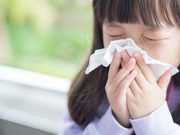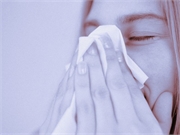Tag: Allergies: Nasal
Clinical Signs Tied to Rhinosinusitis ID’d in Patients With Nasal Allergies
CRS linked to SNOT-22 nasal subdomain items of need to blow nose, thick nasal discharge, sense of taste/smell, and blockage/congestion of nose
Guideline Issued for Management of Inhalant Allergies With Immunotherapy
Authors strongly recommend that clinician performing allergy skin testing or allergen immunotherapy be able to diagnose, manage anaphylaxis
Racial, Ethnic Disparities Seen for Subcutaneous Allergen Immunotherapy
Black, Hispanic patients have lower rates of initiation than White patients
Risk for Melanoma Reduced for Individuals With Atopy
Fewer cases of melanoma, lower investigator-estimated risk class of skin cancer observed in atopic versus nonatopic individuals
FDA Panel to Again Weigh Merit of Decongestant That Many Call Useless
Agency's Nonprescription Drugs Advisory Committee will meet in April to consider the effectiveness of the oral version of phenylephrine
Hay Fever Symptoms Worse in Urban Versus Rural Areas
Levels of pollutants, pollen counts, and seasonality across land-use types may impact symptoms, authors say
One-Third of YouTube Hay Fever Videos Are Misleading
In addition, less than half contain useful information
Prenatal, Postnatal Exposure to PM2.5 Linked to Pediatric Allergic Rhinitis
Association seen between incident allergic rhinitis and increase in PM2.5 during period from 30 gestational weeks to 52 weeks after birth














